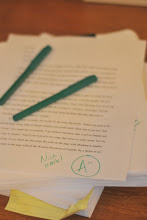With only twelve days to go before we meet agin in our office for another year, I am engaging in denial. Well, not entirely. But I am sure not doing any curriculum mapping.
I am, however, doing a lot of reading right now. So here are some note and thoughts on my summer reads. I did read, on the recommendation of a mutual friend, Thomas Newkirk's Holding On To Good Ideas in a Time of Bad Ones (Heineman 2009). I enjoyed it very much and he had some good thoughts on both the state of education and what we as teachers might do in response to some of the crazy stuff that is happening right now. I am not doing any sort of in-depth review here, but I liked the book.
Inspired by a reference in an article in the online Journal of Educational Controversy called "Beautiful Losers" by William Lyne (which was also an interesting essay), I have been reading Managing the Commons, edited by Garrett Hardin and John Baden (1977). It is a collection of essays responding to Hardin's essay, "The Tragedy of the Commons" (Science 1968) which essentially looked at what happens when individual interest is pitted against community interest. I stumbled across this idea this summer and it grabbed my attention as a way of thinking about some of our struggles with education in a democratic nation. Hardin was focused on environmental concerns, but it seemed to me that his idea is really applicable to education. Hopefully a longer and more in-depth post will follow.
Finally, but by no means comprehensively, this month's College English (NCTE), which was focused on Latina/o issues in teaching college writing, had an article by Mark Noe that had a line that really struck me as I thought about the upcoming year (okay Shelley, ya got me, I am thinking about it). Near the end of the essay "The Corrido:A Border Rhetoric" (July 596-605) Noe says,
...I try to make a space in which students are welcome to do the one thing that academic discourse does best: question-question me, my assumptions, my objectivity, my culture. I watch for those moments when students deviate from the conventional, not so I can assess their digressions, but so I can listen for what they have to tell me. (603)The limiting nature of our classroom discourse can be pretty repressive, even in the hands of a compassionate teacher. How many times have I redirected a student away from an impassioned response to a work in favor of a more 'analytical' approach? How little time is there in my class for writing that is a genuine and meaningful expression of something relevant in my students lives? I can't quit the academic discourse entirely, it will still form a majority share of what the course I teach is all about, but it would be good, I think, to admit a little more humanity into the room. I would like to listen to my students a bit more, and talk a bit less. We will see.
F. Scott


No comments:
Post a Comment